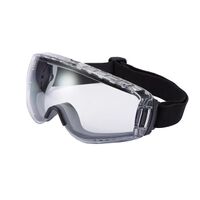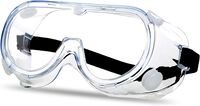Difference between revisions of "Safety Goggles"
| Line 15: | Line 15: | ||
There is a tendency to be lazy with tools and leave them haphazardly around the workshop. Most people tend to work like | There is a tendency to be lazy with tools and leave them haphazardly around the workshop. Most people tend to work like | ||
this. But with a nice pair of goggles, you want to be 100% careful about where you put them. Always leave them with the | this. But with a nice pair of goggles, you want to be 100% careful about where you put them. Always leave them with the | ||
| − | lens facing up or on its side (never down). | + | lens facing up or on its side (never down). |
| − | + | ||
| + | For resources on repairing safety glasses or goggles see: | ||
| + | * https://www.youtube.com/watch?v=kYJ07KYE_yk - Using 2000 grit sandpaper and polishing compound. | ||
| + | * https://www.youtube.com/watch?v=yzelPu1W6Fs - Using a buffer wheel w/polish compound, 1200 grit sandpaper, and possibly 3000 grit sandpaper. | ||
Revision as of 14:46, 5 April 2024
Safety glasses (at a bare minimum) or better, Safety Goggles are highly recommended for all work with any chemicals. Of particular danger is the catalysts ( MEKP or Part B of Epoxy). The catalyst tend to be more hazardous and reactive than the resins.
Safety Goggles
Eyes should be protected from splashing of resin, or any catalyst. You can purchase ANSI Z87 rated safety glasses, but we would highly recommend you instead purchase a pair of safety goggles such as pictured. A good name brand pair of Safety Goggles include a rubber gasket to better seal around the eyes, as well as offering better visibility due to a larger lens, and a tendency to fog up less in cooler weather.
Details
It's possible to get a name brand pair of Safety Goggles from local industrial suppliers (but as of 2024, big box stores such as Home Depot do not have them). I don't recommend any particular manufacturer, and you are encouraged to do your own research. I would assume that the companies that make Ski Goggles make good goggles for working with chemicals. This is not surprising, since the end product is similar. The pair I recently purchased was $20-30 picked up retail at a Grainger (again, not recommended, just the first that came up in a search). $20-30 is a lot more than a pair of safety glasses. but this is to protect eyesight, and the advantages will outweigh any of the cost. They simply make working with eye protection a better experience, and there is no going back to safety glasses, once you have a good pair of goggles. They protect the eyes better, are more comfortable, fog less, and visibility is better. They also fit the Respirator much better than a pair of safety glasses does.
Do Not Buy These Low Cost Goggles
I do not recommend the low cost ($7) goggles such as pictured. These goggles are intended for mass production, and universal fit. They are useless because the fit is always a poor one around the edges. There is no proper rubber gasket around the side (just the plastic of the goggle). And the head strap is not as well made. This type of goggle should be completely avoided.
Tips/Techniques
Do Not Scratch the Goggles
The first thing you should realize with the goggles, is that you absolutely under no circumstances want to scratch them. There is a tendency to be lazy with tools and leave them haphazardly around the workshop. Most people tend to work like this. But with a nice pair of goggles, you want to be 100% careful about where you put them. Always leave them with the lens facing up or on its side (never down).
For resources on repairing safety glasses or goggles see:
- https://www.youtube.com/watch?v=kYJ07KYE_yk - Using 2000 grit sandpaper and polishing compound.
- https://www.youtube.com/watch?v=yzelPu1W6Fs - Using a buffer wheel w/polish compound, 1200 grit sandpaper, and possibly 3000 grit sandpaper.

